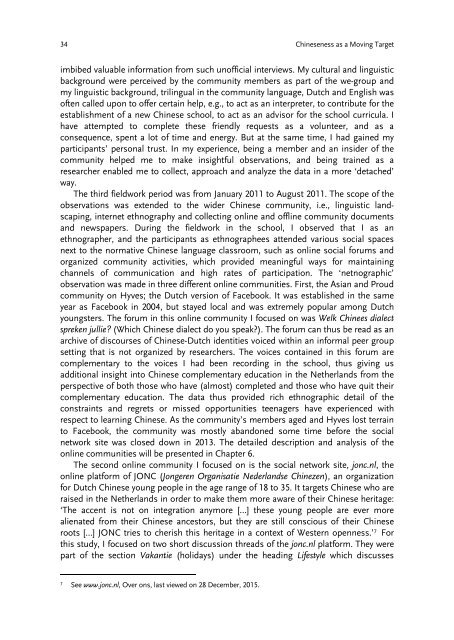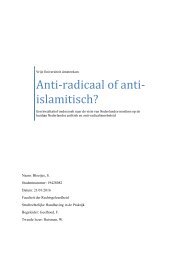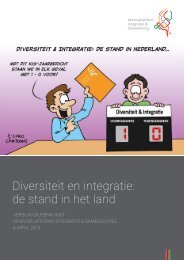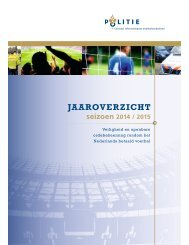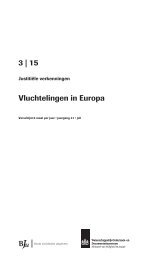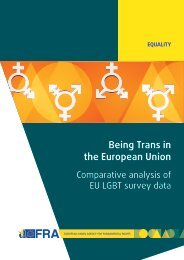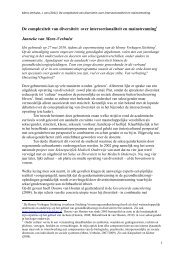Tilburg University Chineseness as a Moving Target Li Jinling
Li_Chineseness_12_09_2016
Li_Chineseness_12_09_2016
Create successful ePaper yourself
Turn your PDF publications into a flip-book with our unique Google optimized e-Paper software.
34 <strong>Chineseness</strong> <strong>as</strong> a <strong>Moving</strong> <strong>Target</strong><br />
imbibed valuable information from such unofficial interviews. My cultural and linguistic<br />
background were perceived by the community members <strong>as</strong> part of the we-group and<br />
my linguistic background, trilingual in the community language, Dutch and English w<strong>as</strong><br />
often called upon to offer certain help, e.g., to act <strong>as</strong> an interpreter, to contribute for the<br />
establishment of a new Chinese school, to act <strong>as</strong> an advisor for the school curricula. I<br />
have attempted to complete these friendly requests <strong>as</strong> a volunteer, and <strong>as</strong> a<br />
consequence, spent a lot of time and energy. But at the same time, I had gained my<br />
participants’ personal trust. In my experience, being a member and an insider of the<br />
community helped me to make insightful observations, and being trained <strong>as</strong> a<br />
researcher enabled me to collect, approach and analyze the data in a more ‘detached’<br />
way.<br />
The third fieldwork period w<strong>as</strong> from January 2011 to August 2011. The scope of the<br />
observations w<strong>as</strong> extended to the wider Chinese community, i.e., linguistic landscaping,<br />
internet ethnography and collecting online and offline community documents<br />
and newspapers. During the fieldwork in the school, I observed that I <strong>as</strong> an<br />
ethnographer, and the participants <strong>as</strong> ethnographees attended various social spaces<br />
next to the normative Chinese language cl<strong>as</strong>sroom, such <strong>as</strong> online social forums and<br />
organized community activities, which provided meaningful ways for maintaining<br />
channels of communication and high rates of participation. The ‘netnographic’<br />
observation w<strong>as</strong> made in three different online communities. First, the Asian and Proud<br />
community on Hyves; the Dutch version of Facebook. It w<strong>as</strong> established in the same<br />
year <strong>as</strong> Facebook in 2004, but stayed local and w<strong>as</strong> extremely popular among Dutch<br />
youngsters. The forum in this online community I focused on w<strong>as</strong> Welk Chinees dialect<br />
spreken jullie? (Which Chinese dialect do you speak?). The forum can thus be read <strong>as</strong> an<br />
archive of discourses of Chinese-Dutch identities voiced within an informal peer group<br />
setting that is not organized by researchers. The voices contained in this forum are<br />
complementary to the voices I had been recording in the school, thus giving us<br />
additional insight into Chinese complementary education in the Netherlands from the<br />
perspective of both those who have (almost) completed and those who have quit their<br />
complementary education. The data thus provided rich ethnographic detail of the<br />
constraints and regrets or missed opportunities teenagers have experienced with<br />
respect to learning Chinese. As the community’s members aged and Hyves lost terrain<br />
to Facebook, the community w<strong>as</strong> mostly abandoned some time before the social<br />
network site w<strong>as</strong> closed down in 2013. The detailed description and analysis of the<br />
online communities will be presented in Chapter 6.<br />
The second online community I focused on is the social network site, jonc.nl, the<br />
online platform of JONC (Jongeren Organisatie Nederlandse Chinezen), an organization<br />
for Dutch Chinese young people in the age range of 18 to 35. It targets Chinese who are<br />
raised in the Netherlands in order to make them more aware of their Chinese heritage:<br />
‘The accent is not on integration anymore […] these young people are ever more<br />
alienated from their Chinese ancestors, but they are still conscious of their Chinese<br />
roots […] JONC tries to cherish this heritage in a context of Western openness.’ 7 For<br />
this study, I focused on two short discussion threads of the jonc.nl platform. They were<br />
part of the section Vakantie (holidays) under the heading <strong>Li</strong>festyle which discusses<br />
7<br />
See www.jonc.nl, Over ons, l<strong>as</strong>t viewed on 28 December, 2015.


